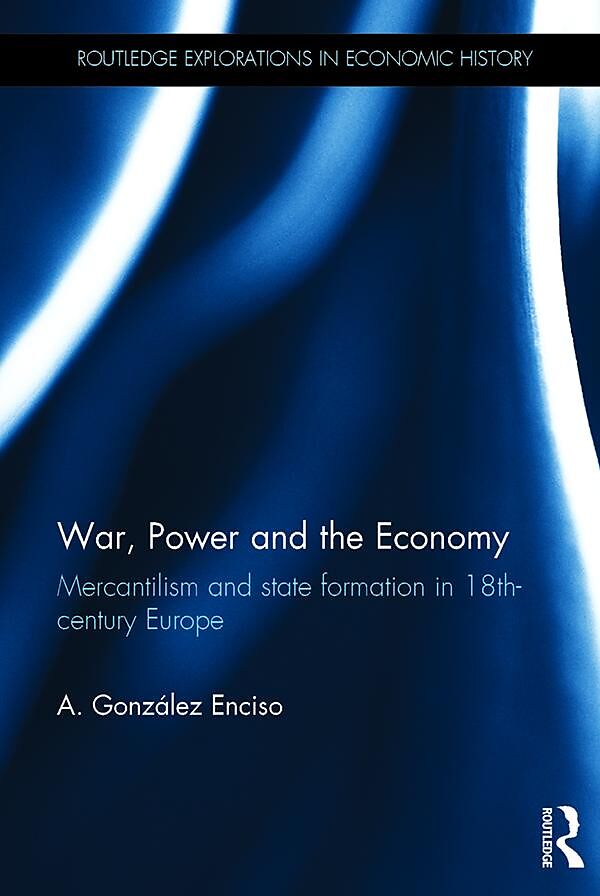War, Power and the Economy
Format:
E-Book (EPUB)
EAN:
9781317518228
Untertitel:
Mercantilism and state formation in 18th-century Europe
Genre:
Geschichte
Autor:
A. González Enciso
Herausgeber:
Taylor & Francis
Anzahl Seiten:
302
Erscheinungsdatum:
04.10.2016
ISBN:
978-1-317-51822-8
This book contains a comparative history of Great Britain, France and Spain, the three rival empires of the 1700s. It explores how the states prepared for war, what kind of economic means they had, what institutional changes they implemented, and how efficient this was. As such, the book presents the first comparative synthesis aiming to understand the outcome of the global confrontation in the eighteenth century. The book takes the idea that making war or preparing for it obliged governments to make important changes in their institutions, so that during the eighteenth century the state in many ways formed itself through war efforts.
Autorentext
A. González Enciso is Professor of Early Modern History at the Universidad de Navarra, Spain. His research interests have been focused on the economic history of eighteenth-century Spain, namely industrial and financial history, and he is a member of the international Contractor State Group.
Zusammenfassung
War, Power and the Economy contains a comparative history of Great Britain, France and Spain, the three rival empires of the 1700s. It explores how the states prepared for war, what kind of economic means they had, what institutional changes they implemented, and how efficient this was. As such, the book presents the first comparative synthesis aiming to understand the outcome of the global confrontation in the eighteenth century.a Faced with the challenge of paying for new and more costly wars, some countries found flexible ways to get more money and better supplies, whereas others did not. The development of freer colonial markets, the increase of consumption and its taxation, the problems of venal administration or the different systems of patronage with contractors, are some of the factors explaining the divergences that were made clear by 1815. This book explores political and economic dimensions of the eighteenth-century European state in order to explain why and how changes in power as an outcome of war depended upon the available means and the way they were obtained and used. The book takes the idea that making war or preparing for it obliged governments to make important changes in their institutions, so that during the eighteenth century the state in many ways formed itself through war efforts. Ultimately, this study aims to show how closely political and military success was entwined with economic interests. This volume is of great interest to those who study economic history, political economy and European history.
Inhalt
List of figures List of tables Preface Acknowledgements Introduction Three powers looking for resources Spain and its eighteenth-century rivals War and the early modern state Method and timeframe 1 Changing strategies and global power in the long eighteenth century 1.1 The long consequences of Utrecht 1.2 Warfare interests and motives 1.3 Spain in eighteenth-century international politics 2 Eighteenth-century realities and historiographical approaches 2.1 Absolutism vs. parliamentarism 2.2 The eighteenth-century military revolution 2.3 The increasing war cost 2.4 Fiscal-military states: the development of a methodological concept 3 Administering the fiscal-military state: ordinary revenues - trusting in a consumer's world 3.1 The increase in the tax trawl 3.2 The fiscal structure: direct or indirect taxes 3.3 Divergent paths: the trend of the fiscal structure in the long eighteenth century 3.4 Tobacco and metals, the pearls of the Empire 3.5 Possibilities and flexibility of fiscal policies 3.6 Changes in the fiscal structure as from the eighties and the breakdown of some systems 4 Increasing revenue through administration change: direct administration of taxes 4.1 Direct administration vs. tax farming. Why were taxes farmed out? 4.2 England takes the lead 4.3 The impossible reform of the French system 4.4 Spain facing the modernity of direct administration 4.5 Administering to implement a new system 4.6 A political agenda against tax farmers? 4.7 Consequences and stocktaking 4.8 The tax farmers' profit 4.9 Looking to the future of finance possibilities 5 Growing needs: the cost of war and extraordinary revenue 5.1 The management of extraordinary expenditure 5.2 Two different and similar models: Great Britain and France 5.3 Spain: from the extraordinary single tax to the need of debt 6 Foreseeing difficulties and administering for the future: the public debt 6.1 The necessary public debt 6.2 British borrowing: the love of debt 6.3 France, the unmanageable debt 6.4 Spain, debt phobia 6.5 Debt and destiny 7 The administration of income: spending and the contractor state 7.1 Contractor state: a precise concept 7.2 The contractor state and fiscal-military state 7.3 Contractor state and mercantilism7.4 State, market and monopoly: how are supply procedures managed? 7.5 From open market to monopoly 7.6 The contractor state and army victualling 8 Shipbuilding, the navy and the contractor state 8.1 Victualling the navy 8.2 The contractor state and shipbuilding: the British experience 8.3 The strategic worries of France 8.4 New arrangements for supplying the Spanish navy 9 Arms provisioning and the contractor state 9.1 The king's powder 9.2 Small arms: the kingdom of craftsmen 9.3 Iron ordnance: the kingdom of gunfounders 9.4 Military entrepreneurs in Spain's cast-iron cannon factories 9.5 From purchaser state to manufacturer state: nationalisation of the arms factories in the seventies 9.6 The limitations of the model Conclusions Bibliography Index

Leider konnten wir für diesen Artikel keine Preise ermitteln ...
billigbuch.ch sucht jetzt für Sie die besten Angebote ...
Die aktuellen Verkaufspreise von 3 Onlineshops werden in Realtime abgefragt.
Sie können das gewünschte Produkt anschliessend direkt beim Anbieter Ihrer Wahl bestellen.
Loading...
Die aktuellen Verkaufspreise von 3 Onlineshops werden in Realtime abgefragt.
Sie können das gewünschte Produkt anschliessend direkt beim Anbieter Ihrer Wahl bestellen.
| # | Onlineshop | Preis CHF | Versand CHF | Total CHF | ||
|---|---|---|---|---|---|---|
| 1 | Seller | 0.00 | 0.00 | 0.00 |
